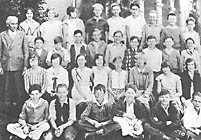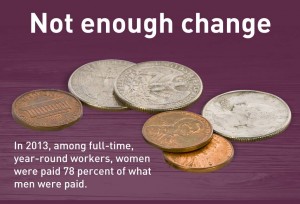Th e Fifth Circuit of the U.S. Court of Appeals temporarily reversed a U.S. district court’s decision that struck down as unconstitutional two provisions of Texas’ anti-abortion bill, House Bill 2 (HB 2). Other provisions of HB 2 have already forced half of Texas abortion clinics to close—down from 41 in June 2013 to 20 in June 2014. The recent ruling allows Texas to enforce the HB 2 provision requiring clinics that provide abortion to meet the same strict standards as surgical centers. If the ruling stands, it will force 13 more clinics to close, leaving Texas with only a few abortion providers in Dallas, Fort Worth, Houston, Austin, and San Antonio and no providers in the Rio Grande Valley or West Texas. AAUW of Texas strongly opposed HB 2 and delivered signatures against the bill to the legislature before it was passed.
e Fifth Circuit of the U.S. Court of Appeals temporarily reversed a U.S. district court’s decision that struck down as unconstitutional two provisions of Texas’ anti-abortion bill, House Bill 2 (HB 2). Other provisions of HB 2 have already forced half of Texas abortion clinics to close—down from 41 in June 2013 to 20 in June 2014. The recent ruling allows Texas to enforce the HB 2 provision requiring clinics that provide abortion to meet the same strict standards as surgical centers. If the ruling stands, it will force 13 more clinics to close, leaving Texas with only a few abortion providers in Dallas, Fort Worth, Houston, Austin, and San Antonio and no providers in the Rio Grande Valley or West Texas. AAUW of Texas strongly opposed HB 2 and delivered signatures against the bill to the legislature before it was passed.
Paycheck Fairness
The latest data from the U.S. Census Bureau show that women make just 78 cents for every dollar men make. This is real life for women working in a country with a gender pay gap alive and well. The latest data from the U.S. Census Bureau illustrate how that gap affects women, who are the primary source of income for 40 percent of American families. The gap is even worse for minority women. Read more HERE.
Last week, the Senate voted to move forward on the Paycheck Fairness Act. But then 20 senators reversed course. It’s time to get mad and hold elected officials to the promise of a conversation through our votes in the 2014 midterm elections and by keeping equal pay on the forefront of our representatives’ minds in the next Congress.
A Tribute to National Hispanic Heritage Month
September 15th to October 15th has been designated as National Hispanic Heritage Month when we celebrate the contribution of Hispanics to our country. A little known, but major contribution is “The Lemon Grove Incident” which was the first successful desegregation court case, 23 years before Brown v the Board of Education.
 Lemon Grove is a small rural town near San Diego. On January 5, 1931 the Principal of Lemon Grove Elementary School, Jerome T. Greene, directed the 75 Mexican children to go to the new wooden building instead. The School Board had secretly established a separate school for students of Mexican ancestry in the hope of “Americanizing” them, which was commonly done in the South West at the time. Instead the 75 children all went home and their parents refused to send them to school.
Lemon Grove is a small rural town near San Diego. On January 5, 1931 the Principal of Lemon Grove Elementary School, Jerome T. Greene, directed the 75 Mexican children to go to the new wooden building instead. The School Board had secretly established a separate school for students of Mexican ancestry in the hope of “Americanizing” them, which was commonly done in the South West at the time. Instead the 75 children all went home and their parents refused to send them to school.
Before long a student was chosen as the plaintiff in the case of Roberto Alvarez v the Lemon Grove School Board. On March 30, 1931, a judge ruled against the Lemon Grove School Board. But his ruling was based on the premise that Mexicans were officially Caucasians. At that time under state law, Caucasian students could not legally be segregated from other Caucasians. But state law allowed segregation of Black, Asian, and Indian children. Read more HERE
The case failed to get much attention after that, and segregation of Mexican-Americans continued outside Lemon Grove. Americanization schools operated throughout the Southwest until they were abolished by landmark court rulings. One such case was Mendez v Westminster School District in Orange County. On February 18, 1946, the Court’s decision was in favor of the plaintiffs and the 9th Circuit Court of Appeals upheld the decision in 1947. Governor Earl Warren signed into law the repeal of remaining segregationist provisions in the California statutes. Warren was later to preside over Brown v the Board of Education. Read more HERE.
Keep Your Fingers Crossed
 On Wednesday, for the first time ever, the Senate voted (73-25) to move forward with a debate on the Paycheck Fairness Act. AAUW members have been leading the fight to pass the PFA, which would give employees the tools they need to uncover and challenge unlawful pay discrimination. Despite possible attempts to weaken the legislation with amendments, the Senate is expected to hold additional votes on the PFA early next week.
On Wednesday, for the first time ever, the Senate voted (73-25) to move forward with a debate on the Paycheck Fairness Act. AAUW members have been leading the fight to pass the PFA, which would give employees the tools they need to uncover and challenge unlawful pay discrimination. Despite possible attempts to weaken the legislation with amendments, the Senate is expected to hold additional votes on the PFA early next week.
Women’s Equality Day
Women’s Equality Day commemorates August 26, 1920, when votes to women officially became part of the US constitution. This day marks a turning point in the history of the struggle for equal treatment of women and women’s rights. In 1920, the day stood for the result of 72 years of campaigning by a huge civil rights movement for women. Prior to movements like these, even respected thinkers such as Rousseau and Kant believed that woman’s inferior status in society was completely logical and reasonable; women were ‘beautiful’ and ‘not fit for serious
employment’. Over the last century, great women have proved these views wrong as the world has witnessed just what women are capable of achieving, from the likes of Rosa Parks and Eleanor Roosevelt fighting for civil rights and equality to great scientists such as Marie Curie, Rosalind Franklin and Jane Goodall. The last century has shown more than ever what both women and men are capable of achieving.
Today, women’s equality has grown to mean much more than just sharing the right to the vote.
Organizations such as Equality Now and Womankind Worldwide continue to work to provide women across the globe with equal opportunities to education and employment, pushing against suppression and violence towards women and against the discrimination and stereotyping which still occur in every society. So on Women’s Equality Day, let the men do the dishes and the women do the DIY projects, think about supporting women’s empowerment projects in developing countries, stop thinking about men and women as separate beings with separate roles and start thinking about treating people as equals.


